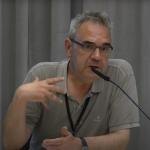It makes sense for the EU to be a frontrunner in the transition to a post-growth society. Firstly, as a matter of ecological justice. EU countries bear the greatest historical responsibility for the crises of climate and biodiversity. The EU is also one of the wealthiest parts of the world. Abandoning economic growth would free up natural resources for the Global South, where growth still contributes to well-being.
Secondly, a post-growth EU would gain in resilience. It is better to manage the end of growth through democratic deliberation than to have it imposed on us by ecological breakdown or resource conflicts.
Defending democracy
However, a resilient EU must be able to withstand not only ecological shocks or trade disruptions, but also military aggression. Today, the conflict between democracy and autocracy plays out grimly before our eyes in Ukraine. Critics of economic growth cannot look away from the threat posed by militant authoritarianism, as there is no doubt that the transition beyond growth must be democratic. Democracy offers a public space to challenge the growth dogma. Many ‘degrowthers’ even advocate deepening democracy by extending it to the economic sphere, as a way to overcome the growth compulsion of shareholder capitalism.
Will a post-growth EU be able to defend itself, its allies, democracy, human rights and a rules-based international order against attacks by the likes of Russia or China? The power of countries and alliances is usually measured by their GDP and military capabilities. The Ukraine war largely confirms this metric. Without billions in western support, both money and arms, Ukraine would not be able to hold out against the Russian aggressor, who is intent on destroying the European security order. Seen this way, a post-growth EU makes itself vulnerable.
Strengthening external action
The first way to increase resilience in matters of war and peace is to reduce the waste of resources in external action. Too often, European diplomacy is a cacophony of national self-inflations. European defence is plagued by fragmentation, duplication and lack of interoperability between national armed forces. A post-growth could no longer afford these ‘costs of non-Europe’. It would need to set off for deeper integration. This includes robust oversight of democracy and the rule of law within its borders, no more vetoes in foreign and security policy, speaking with one voice and getting serious about defence integration. The better the member states’ military forces fit together, the more bang we get for our buck.
In the global confrontation between democracy and autocracy, the US may defect from our camp at the next presidential election, if Trump or a Trumpist prevails. Either way, the US will increasingly focus on threats from China rather than Russia. The EU has no choice but to reduce its security dependence on the US.






Reacties
30 juli 23
chris peeters
Degrowth
It would be nice for the degrowth debate to be concrete and focused on the possibilities of people.
For example: 5G - the internet of things - will need an enormous amount of electric power and with it use of scarce materials. Should we oppose 5G and how can people avoid using 5G?
Most electrical apparatuses are very difficult to repair. How can we help people to buy only reparable stuff and create a local infrastructure to facilitate repair.